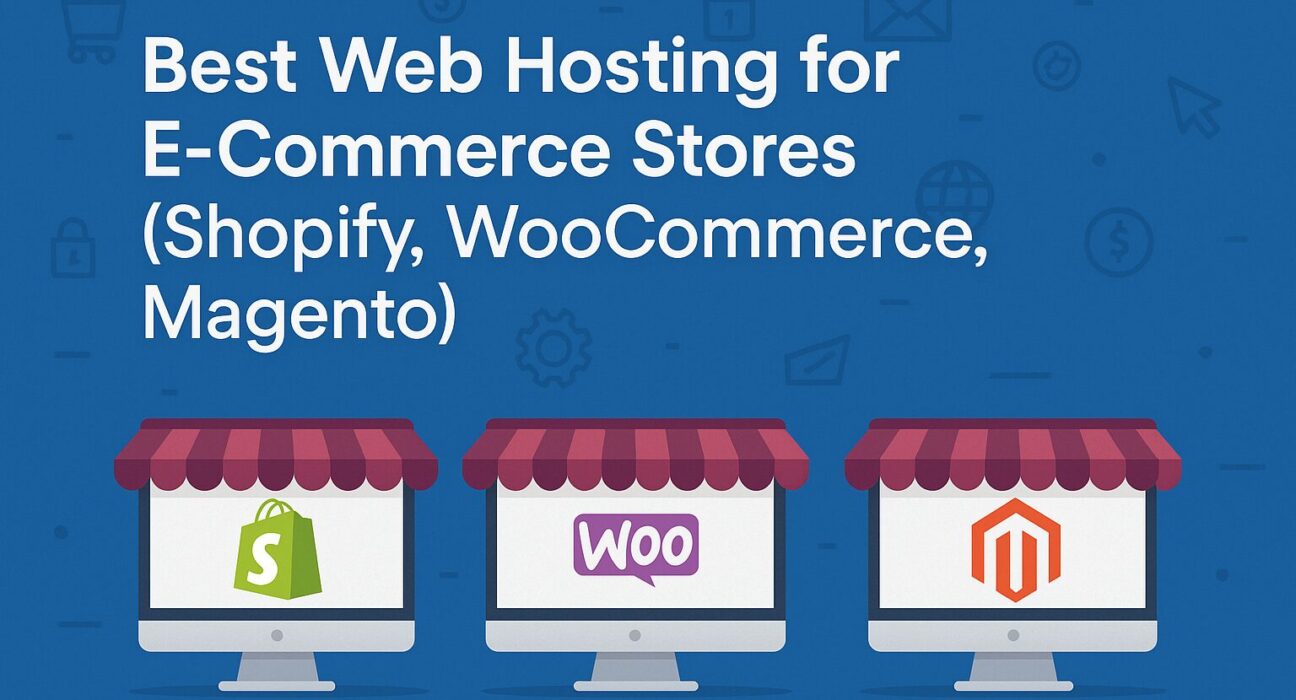Quick Summary
Choosing the right web hosting is crucial for the success of any e-commerce store. Whether you’re running a Shopify, WooCommerce, or Magento store, this guide compares the best hosting providers tailored for performance, scalability, security, and cost-efficiency in 2025.
Index
SiteGround
SiteGround is a top-rated host for WooCommerce with superior speed, security, and support.
Features: Managed WordPress & WooCommerce, Free SSL, Daily backups, SG Optimizer
Benefits: Excellent uptime, fast support, scalable cloud plans
Pros: Great for WooCommerce, strong security, helpful tools
Cons: No monthly plans, higher renewal rates
Pricing: $2.99/mo – $7.99/mo
Bluehost
Bluehost is officially recommended by WordPress and offers robust hosting for WooCommerce users.
Features: 1-click WooCommerce install, Free domain, Free SSL, 24/7 support
Benefits: Beginner-friendly, good performance, affordable plans
Pros: Easy setup, WooCommerce optimized, good value
Cons: US-based servers only, upsells
Pricing: $2.95/mo – $13.95/mo
Cloudways
Cloudways offers flexible, high-performance cloud hosting for Magento, WooCommerce, and more.
Features: DigitalOcean, AWS, GCP servers, SSD storage, Advanced cache, Staging tools
Benefits: Excellent scalability, top-tier performance
Pros: No downtime scaling, team collaboration tools
Cons: No cPanel, slightly technical
Pricing: $11/mo – $80+/mo
Hostinger
Hostinger is a budget-friendly yet powerful host for small-to-medium e-commerce sites.
Features: LiteSpeed servers, Cloudflare CDN, Free SSL, hPanel
Benefits: Fast, secure, cheap hosting with WooCommerce compatibility
Pros: Affordable, great performance, AI tools
Cons: No phone support, limited storage on low plans
Pricing: $2.49/mo – $9.99/mo
A2 Hosting
A2 Hosting is known for its Turbo Servers that provide high-speed performance for WooCommerce stores.
Features: Turbo servers, Free site migration, Free SSL, Auto backups
Benefits: Blazing-fast load times, optimized for e-commerce
Pros: High-speed servers, anytime money-back guarantee
Cons: Higher renewal cost, advanced caching on high-tier only
Pricing: $2.99/mo – $12.99/mo
GreenGeeks
GreenGeeks combines eco-friendly hosting with solid WooCommerce and Magento support.
Features: 300% green energy match, Free SSL, WooCommerce support, Built-in caching
Benefits: Environmentally conscious, reliable performance
Pros: Eco-friendly, security-focused, fast load times
Cons: No Windows hosting, limited global data centers
Pricing: $2.95/mo – $8.95/mo
Kinsta
Kinsta is a premium managed WordPress hosting service trusted by high-traffic WooCommerce sites.
Features: Google Cloud Platform, Auto-scaling, Edge Caching, Free Migrations
Benefits: Enterprise-grade infrastructure, expert support
Pros: Blazing speed, top-tier support, powerful dashboard
Cons: Pricey for beginners, no email hosting
Pricing: $35/mo – $165+/mo
Nexcess
Nexcess offers optimized Magento and WooCommerce hosting with advanced performance tools.
Features: Staging, CDN, Auto-scaling, PCI compliance, Visual comparison
Benefits: Perfect for Magento & WooCommerce, high performance
Pros: Magento specialists, high reliability
Cons: Complex pricing, more advanced for beginners
Pricing: $21/mo – $99+/mo
WP Engine
WP Engine is a managed hosting powerhouse for WordPress and WooCommerce websites.
Features: Genesis Framework, Daily backups, Dev tools, Managed security
Benefits: Developer-friendly, elite WordPress performance
Pros: Great for WooCommerce, excellent support
Cons: No email hosting, higher cost
Pricing: $20/mo – $115+/mo
FastComet
FastComet offers global data centers and reliable WooCommerce-ready cloud hosting.
Features: Free daily backups, Global CDN, SSD-only storage, Free SSL
Benefits: Strong global reach, affordable WooCommerce hosting
Pros: 24/7 support, security tools, cPanel access
Cons: Small storage on entry plan, upsells
Pricing: $2.19/mo – $9.95/mo
Frequently Asked Questions
What is eCommerce hosting?
It’s a type of web hosting optimized for online stores, offering features like SSL, PCI compliance, and scalability.
Which hosting is best for WooCommerce?
SiteGround and Bluehost are among the best choices for WooCommerce due to speed and support.
Which hosting is ideal for Magento?
Nexcess and Cloudways provide tailored Magento hosting with high performance.
Is shared hosting good for eCommerce?
It can be for small stores, but VPS or cloud hosting is recommended for larger traffic.
Do I need managed hosting?
Managed hosting simplifies updates, security, and performance — ideal for store owners without technical skills.
Does hosting affect store speed?
Yes. Fast hosting ensures better page load times, which boosts conversions and SEO.
Is SSL mandatory for online stores?
Absolutely. It encrypts data and builds trust with customers. Most hosts include it for free.
Can I host Shopify myself?
No. Shopify is a hosted solution — you don’t need separate hosting.
What is PCI compliance?
PCI compliance ensures your store meets standards for secure credit card transactions.
Which hosts offer automatic backups?
Hosts like SiteGround, FastComet, and WP Engine include daily automatic backups.
Can I change hosts later?
Yes. Most hosts offer free site migrations to help you move.
What is the average cost of eCommerce hosting?
Costs range from $2.49/month (shared) to $100+/month (managed cloud hosting).
Do I need a domain with my hosting?
Some hosts provide a free domain for the first year; otherwise, you can use your own.
Does hosting include email?
Some include it (e.g., Bluehost), while others (like Kinsta) do not.
Which hosting has the best uptime?
Kinsta, WP Engine, and SiteGround offer 99.9%+ uptime guarantees.
How many visitors can shared hosting handle?
Up to ~10,000/month for basic plans. Higher traffic requires VPS or cloud.
Is WooCommerce better on WordPress hosting?
Yes. WooCommerce is built for WordPress, so optimized hosting improves its performance.
Do I need CDN for my store?
Yes. CDNs like Cloudflare improve site speed globally, especially for international customers.
What is auto-scaling in hosting?
Auto-scaling adjusts resources dynamically based on traffic, preventing site crashes.
Which hosting is best for beginners?
Bluehost and Hostinger are very beginner-friendly with simple dashboards and setup.
Comparison Table
| Hosting Provider | Best For | Key Features | Free Domain | Price Range |
|---|---|---|---|---|
| SiteGround | WooCommerce | Free SSL, Backups, SG Optimizer | Yes | $2.99 – $7.99 |
| Bluehost | WooCommerce | 1-click setup, Free domain | Yes | $2.95 – $13.95 |
| Cloudways | Magento, WooCommerce | Cloud hosting, caching, staging | Yes | $11 – $80+ |
| Hostinger | WooCommerce | LiteSpeed, CDN, AI tools | Yes | $2.49 – $9.99 |
| A2 Hosting | WooCommerce | Turbo Servers, Free migration | Yes | $2.99 – $12.99 |
| GreenGeeks | Magento, WooCommerce | Eco-hosting, caching, email | Yes | $2.95 – $8.95 |
| Kinsta | WooCommerce | Google Cloud, Edge Caching | No | $35 – $165+ |
| Nexcess | Magento, WooCommerce | PCI compliance, scaling, CDN | Yes | $21 – $99+ |
| WP Engine | WooCommerce | Genesis framework, backups | No | $20 – $115+ |
| FastComet | WooCommerce | Global CDN, Free SSL, cPanel | Yes | $2.19 – $9.95 |
Conclusion
The right e-commerce hosting provider can significantly impact your store’s speed, uptime, and customer experience. For WooCommerce, SiteGround and Bluehost offer unbeatable value. For Magento, Nexcess and Cloudways are top-tier. Shopify users benefit from its all-in-one hosted platform. Choose based on your platform, budget, traffic, and growth plans — and don’t hesitate to upgrade as your store scales.




